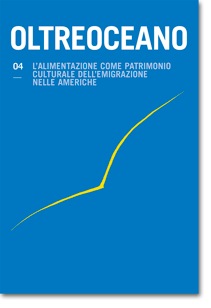Cibo e donna nell’Argentina migratoria: dall’ecletticismo al mosaico culturale nazionale
Keywords:
Argentina, Juana Manuela Gorriti, alimentazione, Alicia Steimberg, Gladys OnegaAbstract
Nel fenomeno migratorio, Il cibo mantiene un legame con la società di appartenenza e allo stesso tempo costruisce una nuova identità: è un prodotto transculturato che crea e alimenta nuovi spazi della vita culturale quotidiana a tutti i livelli sociali, entrando a far parte anche di quell’immaginario collettivo che definisce una comunità nazionale. Lo studio evidenzia, pertanto la stretta relazione donna /cibo attraverso l’analisi dei romanzi di Juana Manuela Gorriti, Alicia Steimberg, Gladys Onega.
Women and Food in Argentina: From Eclecticism to the National Cultural Mosaic
In the migratory phenomenon food establishes both a tie with the country of origin and allows subjects to build a new identity. It is thus a transcultured product that creates and feeds new spaces of daily cultural life at all social levels and becomes part of the collective imagination that defines a national community. This essay examines the close woman/food relationship through the analysis of novels by Juana Manuela Gorriti, Alicia Steimberg and Gladys Onega.
Downloads
References
Appadurai, A. (1982): How to make a National cuisine: cookbooks in Contemporary India. Comparative Study of Society and History, 30,1, pp. 3-24.
Baily, S. (1985): Patrones de residencia de los italianos en Buenos Aires y Nueva York. Estudios migratorios latinoamericanos, VI, 19, pp. 8-47.
Cattarulla, C. (2004): Cocina ecléctica di Juana Manuela Gorriti: un progetto transnazionale. In C. Giorcelli (Ed.), Donne d’America (pp. 87-97). Palermo: ila palma.
Cattarulla, C. & Magnani, I. (2004): L’azzardo e la pazienza. Donne emigrate nella narrativa argentina. Troina: Città Aperta.
Ducrot, V.E. (1998): Los sabores de la patria. Las intrigas de la historia argentina contadas desde la mesa y la cocina. Buenos Aires: Norma.
Iglesia, C. (Ed.) (1993): El ajuar de la patria. Ensayos críticos sobre Juana Manuela Gorriti. Buenos Aires: Feminaria.
Germani, G. (1965, julio): Asimilación de los inmigrantes en el medio urbano. Notas metodológicas. Revista latinoamericana de Sociología, 1, 2, pp. 158-165.
Gorriti, J. M. (1999): Cocina ecléctica. Buenos Aires: Aguilar.
Muzzarelli, M. & Re, L. (Eds.) (2005): Il cibo e la donna nella cultura e nella storia. Prospettive interdisciplinari. Bologna: Clueb.
Iriarte, J. &Torre, C. (1993): La mesa está servida. In C. Iglesia (Ed.). El ajuar de la patria. Ensayos críticos sobre Juana Manuela Gorriti (pp. 45-61). Buenos Aires: Feminaria.
Magnani, I. (2007): Il desco e la lingua. In I. Magnani (Ed.), Il ricordo e l’immagine. Vecchia e nuova identità italiana in Argentina (pp. 87-101). Santa Maria Capua Vetere: Spartaco.
Montanari, M. (2004): Il cibo come cultura. Milano-Bari: Laterza
Onega, G. (1999): Cuando el tiempo era otro. Buenos Aires: Mondadori.
Shua, A.M. (2007): El libro de los recuerdos. Buenos Aires: Emecé.
Silveira, M. J. (2005): Cocina y Comidas en el Río de la Plata. Neuquén: educo.
Steimberg, A. (1992): Cuando digo Magdalena. Buenos Aires: Planeta.
Vidal Bussi, F. (1991, marzo): La rebelión del ajo. Aportes culinarios de los inmigrantes. Todo es historia, 380, pp. 9-22.
Downloads
Published
How to Cite
Issue
Section
License

This work is licensed under a Creative Commons Attribution-NonCommercial-ShareAlike 4.0 International License.
The authors undertake to comply with the following conditions, which are considered accepted at the time of submission of their contributions.
The sending of a text implies that it is unpublished and not submitted to be published elsewhere.
1. If accepted, the author shall confer on the publisher the right to publish and distribute it both in paper form and in the online electronic edition. The published articles will be downloadable and made available in open access.
2. Provided that it correctly indicates that the first publication took place in the journal Oltreoceano. Rivista sulle migrazioni the author has the right to: a) reproduce the article in separate extracts or collected in a volume; b) publish the article on their personal website or teaching site provided that these sites are of a non-commercial nature; c) deposit the article in online archives of a non-commercial nature, linked to the institution they belong to or as part of projects for the non-commercial dissemination and open access of scientific works.
The use of contributions by third parties, for commercial or otherwise unauthorized purposes, is not allowed. The publisher declines all responsibility for the unauthorized use of the material published in the journal.












